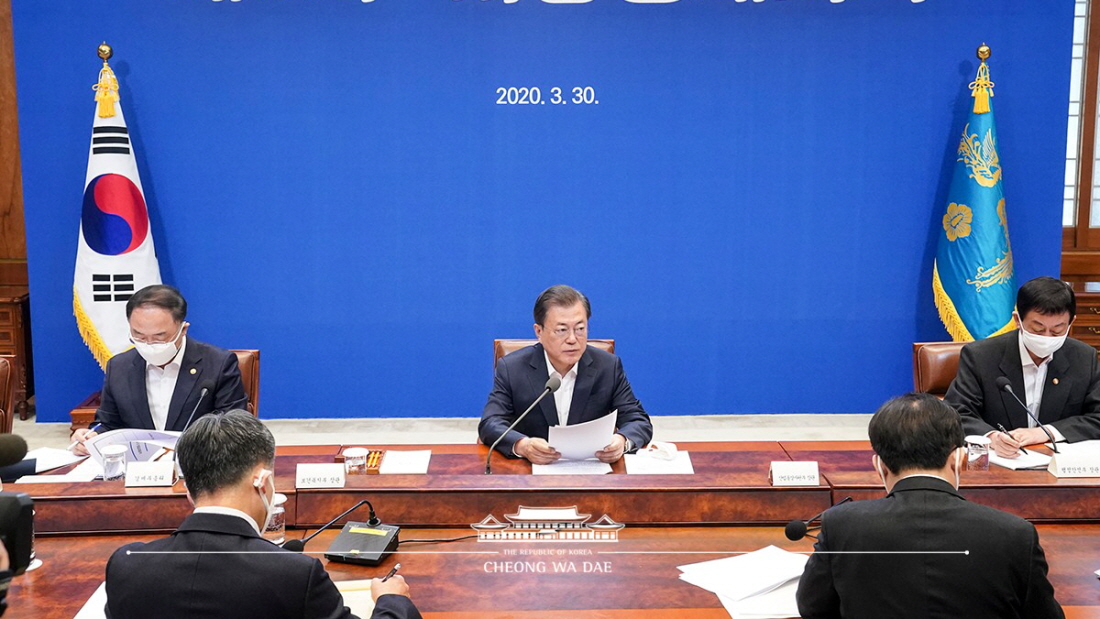이 웹사이트는 제19대 대통령 임기 종료에 따라 대통령기록관이 「대통령기록물 관리에 관한 법률」에 의해 이관받아 서비스하는 대통령기록물입니다. 자료의 열람만 가능하며 수정 · 추가 · 삭제는 불가능합니다.
다만, 「개인정보보호법」에 의하여 개인의 정보를 보호받기 원하시는 분은 관련 내용(요청자, 요청내용, 연락처, 글위치)을 대통령 웹기록물 담당자(044-211-2253)에게 요청해 주시면 신속히 검토하여 조치해 드리겠습니다. 감사합니다.
SPEECHES & REMARKS
BRIEFINGS
Opening Remarks by President Moon Jae-in at 3rd Emergency Economic Council Meeting

We are nearing victory against the COVID-19 outbreak, but my heart is very heavy because a considerable number of people have lost their lives in the process. The fact that our mortality rate is relatively low compared to those of other countries provides no sense of comfort. I extend my deepest sympathy and consolation to all COVID-19 victims and their bereaved families.
Among infectious disease prevention and control measures, the efforts to reduce the number of deaths are more important than anything else. I urge you to put forth extraordinary infectious disease prevention and control efforts for vulnerable communal facilities, including, in particular, mental hospitals, convalescent hospitals and nursing homes that house those with high mortality rates as a result of advanced age, underlying illnesses and weak immune systems.
Our infectious disease prevention and control efforts are now being highly praised around the world thanks to our people who have put their trust in government measures and are actively participating in infectious disease prevention and control procedures with firm solidarity and cooperation.
The method for overcoming the economic crisis caused by the COVID-19 outbreak may be the same. In our current situation, no one can predict just how extensive and deep the scars left behind on the global economy by the COVID-19 pandemic will be or how long those scars will last. The going is difficult right now and, worse yet, the future is uncertain as well. We need a long-term approach to turning around the economy at the end of a dark tunnel while tackling the immediate difficulties.
Despite this hardship, the Government will do its best and take the lead. If the people trust the Government and come together with one mind in the spirit of solidarity and cooperation, we will be fully able to surmount not only the COVID-19 outbreak but also the resultant economic crisis.
As pledged during the 2nd Emergency Economic Council meeting, the Government decided to defer or exempt payment of the four major social insurance premiums and electricity bills for low-income families as well as SMEs, microbusiness owners and the self-employed that are below a certain size. The measures will be immediately applied to payments in March, and the details will be announced separately by the Government. We expect that these will decrease cost-of-living burdens for low-income families and be of help to small-scale businesses with regard to their operations and the retaining of employees.
In addition, we’ve significantly increased subsidies to help businesses maintain employment and expanded various livelihood support measures for the vulnerable who’ve fallen through the cracks of the employment safety net. Along with enhancing job security, these increases are expected to greatly help protect the livelihoods of those on unpaid leaves, the contract-based self-employed, freelancers and day laborers. In addition, they will provide significant assistance to microbusiness owners who’ve suffered damage from the COVID-19 outbreak, helping them recover their operations or close their businesses and get back on their feet.
In cooperation with local governments, the Government made a decision to provide emergency relief payments for those in the bottom 70 percent of the income bracket, including the middle class, which go up to one-million won for a family of four. This decision was not easy to reach, so we’ve held a number of meetings and discussions. All of our people have suffered from the COVID-19 outbreak and participated in infectious disease prevention and control efforts together. Everyone deserves compensation for their pain and efforts.
However, the Government needs to build up as much fiscal space as possible in order to prepare for economic shocks that have no end in sight and to swiftly respond to employment instability and a liquidity crisis among businesses. I call upon those who have the economic means to endure a little more – be broadminded in your understanding and make concessions for those with lower incomes.
With regard to the emergency relief payments, swift distribution is paramount; our plan is to quickly submit a second supplementary budget bill and have the National Assembly pass it within April, right after the general election. Moreover, in order to build up fiscal space and swiftly facilitate an agreement among the ruling and opposition parties, financial resources will be prepared mostly from an excruciating restructuring of expenditures within the government budget. I ask for the National Assembly’s cooperation.
The Government made this decision despite a huge burden on its fiscal operation. The reason is because we believe it’s necessary to shore up the livelihoods of people in need and provide the public with comfort and encouragement in return for their having joined forces to surmount the crisis as the principal agents in the infectious disease prevention and control efforts, even sacrificing their daily lives. Moreover, these payments will play a significant role in reviving our economy by promoting consumption at the time when the COVID-19 outbreak is brought under control.
I extend my infinite respect and gratitude to the people who are striving to overcome the disaster through trust and cooperation while encouraging each other amidst hardship. Moreover, I hope that these measures by the Government will give strength and consolation to the people who are trying to overcome difficulties.



